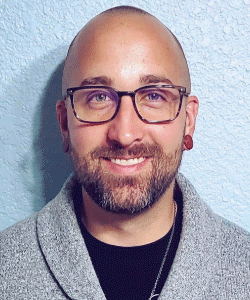First Person
Back Page: Playing PAC-Man and Helping to Shape the Field

Cognitive psychologist Michael Hout recently began a two-year rotation as a program director of the Perception, Action, and Cognition (PAC) program at the U.S. National Science Foundation’s Division of Behavioral and Cognitive Sciences.

(National Science Foundation)
Until recently, you were an associate professor of psychology at New Mexico State University. What prompted your transition to the National Science Foundation?
I have long been interested in working with NSF. I had previously been a proposal reviewer and grant panelist for the agency, and when the opportunity arose to apply for a position as program director, I was extremely excited by the chance to get involved. I’m a two-year rotator now, which means at the end of my time here, I will head back to New Mexico State University full time. This arrangement is a good fit for me because I’m not ready to move away from being a full-time researcher and educator just yet. This position also allows me “independent research and development” time to keep my laboratories at NMSU going (remotely); to travel back home periodically; and to continue mentoring my graduate students through their master’s degrees and PhDs. I wasn’t ready to give up those things either. Educating and mentoring the next crop of scientists is one of the things I enjoy most about being an academic. But most importantly, my position at NSF gives me a chance to truly give back to the scientific community, providing service and helping shape the field of perception, action, and cognition, and getting involved with research in other areas as well. Beyond providing this service, I will also gain insight into how grant funding works; how the process of federal funding is managed; and how to become a better grant proposal writer. I can imagine no better job than one that allows me to simultaneously provide service, shape my field, and better myself at the same time.
Can you tell us a little bit about the grant program you oversee at NSF?
Along with Betty Tuller, I co-direct the program in Perception, Action, and Cognition (PAC) within the Division of Behavioral and Cognitive Sciences in the Social, Behavioral, and Economic Sciences Directorate. Our program funds research on a wide variety of topics related to “typical” human behavior, such as vision, audition, attention, memory, language, motor control, and a great deal more. Additionally, we frequently collaborate (i.e., co-review and/or co-fund) with other programs in the SBE Directorate (e.g., Cognitive Neuroscience, Developmental Science, Science of Learning, Linguistics and Social Psychology) and across other directorates. One of the things I like most about PAC is that we are extremely diverse in topic areas and research methodologies. This field is incredibly interesting and far-reaching, which really opens up a lot of opportunities to work with other programs at NSF.
What do you see as the value of federal funding for starting out an academic career?
That’s a difficult question to answer because there are so many different benefits of acquiring federal funding. The short answer is that it can be a springboard to success and the start of a productive career. Beyond simply the prestige of an NSF award, there are many opportunities that federal funding provides. It’s great for academics who may not have large startup packages in their first job; it can allow for the purchase of crucial laboratory equipment and the funding of graduate students or postdocs; it can allow you to interact with and provide service and opportunity to the wider community; and much more. These things are great not only for your department and laboratory, but also for the principal investigator personally and often for the community. Federal funding can help a PI gain steam and conduct research that simply wouldn’t be possible in the absence of funding. So being successful with an NSF grant can really help an early-career PI get research going in a big way, which often leads to advances and innovations that result in future funding. There’s no better time than now to start applying for NSF funding.
Do you have any advice on how graduate students and early career scientists can engage with NSF?
NSF’s website has lots of information, and my best advice is to start there. Learn what programs fund the kind of research you are involved in, and reach out to the respective program directors. Look at what NSF has funded recently so you have an idea of where the field is headed and what gaps are or are not being filled. Offer (to the PD) to be a reviewer or panelist if you can find the time; the best way to learn more about the whole process is to experience it for yourself. Go to the “NSF Days” that happen at various institutions, or attend webinars when they come up. And best of all, get started early. Grads, that means consider applying for NSF’s Graduate Research Fellowship Program. NSF does a great job of funding budding new scientists, and you can be one of them!
NSF is unique in that it allows scientists like you to “rotate” into the agency and serve for a few years. What are some of the benefits of short-term government service for psychological scientists?
I think it’s a really smart model for both NSF and for the field. For NSF, bringing in rotators means there is always a mix of experienced, permanent PDs and “new blood,” as it were. This helps each program stay current and innovative while being guided by people who know how the institution works and who can help programs be maximally effective. That translates into opportunities for the PI community to apply for funding and have their work seriously considered. For psychological scientists like me, it means the chance to provide service and shape the field at a macro level without transitioning out of my research, teaching, or mentorship. The rotator model also allows people who really want to make a difference to do so at an earlier stage in their career than they may have done otherwise (I still have the ability to go back to my home institution when my rotation is over). In the end, I think it will make a better researcher out of me.
What’s one thing you never knew about NSF that you were surprised to find out?
I think I had in my head that NSF would be a rigid place where every program operates exactly the same way. I had a misconception that government agencies would be run in a one-size-fits-all kind of way, and that couldn’t be further from the truth. Instead, programs inside NSF are extremely variable, and for good reason. Of course, there are lots of rules/laws and various layers of bureaucracy that govern how and what we can do. But the programs are developed over time—by the permanent and rotating PDs, in collaboration with their various supervisors—to best fit the needs of the PI community that they are serving. What works for one program does not necessarily work for another, and there are lots of knobs and dials that can be twisted and tweaked to streamline and enhance the efficiency and effectiveness of their program. NSF does an extremely good job of this, and the result is that each program molds itself and its procedures over time and continues to do so each year.
Back Page showcases particularly interesting work by a wide variety of psychological scientists. Know of a good candidate for a future profile? Contact the Observer at [email protected].





APS regularly opens certain online articles for discussion on our website. Effective February 2021, you must be a logged-in APS member to post comments. By posting a comment, you agree to our Community Guidelines and the display of your profile information, including your name and affiliation. Any opinions, findings, conclusions, or recommendations present in article comments are those of the writers and do not necessarily reflect the views of APS or the article’s author. For more information, please see our Community Guidelines.
Please login with your APS account to comment.